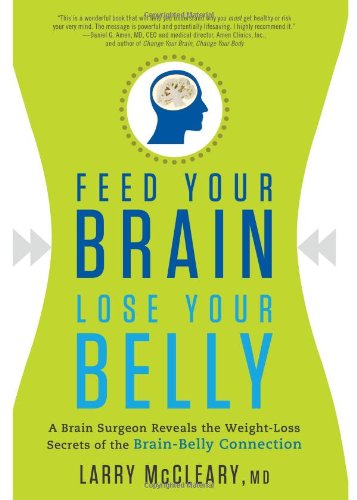Title: Feed Your Brain, Lose Your Belly
Author: Larry McCleary
Year: 2011
Page: 240
Genre: Non-Fiction - Healthy, Weight Loss
FTC Disclosure: Borrowed from the library
Summary (from goodreads.com):
Stay slim and mentally sharp by choosing foods that keep your waistline trim and your brain well fed.
Renowned neurosurgeon Larry McCleary, M. D., became fascinated by the paradox of the fattening of America and the brain starvation he was seeing in aging brains. His research led to this innovative conclusion: Calories you consume are bypassing your brain and being stored in fat cells. In Feed Your Brain Lose Your Belly, he reveals how ''sticky'' fat cells send mixed messages to your brain, causing you to experience persistent hunger, to overeat, and to gain weight as a result.
If you are ready to get in touch with the signals your body generates so that you work with, not against, your innate metabolic machinery, this book is the tool you've been seeking. Weight loss will be easy as you keep hunger at bay while providing your brain with the high-octane fuel it thrives on. Feed Your Brain Lose Your Belly pairs its advice with 7 days' worth of helpful meal plans and plenty of delicious recipes.
Dr. McCleary's counterintuitive perspective on the benefits of brain-healthy fat consumption--supported by clinical testing with a group that called themselves the ''Biggest Losers''--will help you make critical decisions about your diet. Learning to choose foods that prevent the production of sticky fat cells rather than forcing yourself to eat less is the best way for you to feed your hungry brain cells and stay thin.
First Sentence:
This is a book about hope -- hope that we will all live a long and happy life, that we will be around to help and comfort our aging parents and to enjoy our children as they grow up, and to watch them experience all the joys that we savored as children.
My Thoughts:
- I need to lose weight, so the title of this books appeals to my scientific mind as I am curious to know how "feeding your brain" can help that!
- It was a pretty fast read. It was written in lay-person terms so it was easy to understand.
- Dr McCleary suggested to eat approximately 60% fat, 20% protein, 20% carb. Or at least a 2:1 ratio of Fat:Carb. Now, it's about GOOD fat like omega-3, not bad fat like ice cream, cake, cookies. Sigh :( If it was only that easy... He also recommended eating food that won't elevate insulin level so that we'd burn the internal source of energy (fat cell) rather than external source of energy (food). When insulin level is high, fat cells are "locked" up for storage. You're also less likely to feel hungry.
- A lot of the other things he mentioned in the book were common sense, e.g. use spice to add flavor, instead of salt
- The book included recipes, and lists of good carb, bad carb, good fat, bad fat etc. so it was helpful that you didn't have to google what is good and what is bad
- Coconut oil is supposedly good too even though it's thought to be the most saturated fat oil - but not all saturated fat are the same - it has medium chained length saturated fat, not long-chained, so it actually goes into the liver and turns into an energy source, as opposed to being stored in fat cells. (Now I don't know if it's true or not, but that's what was stated in this book. I am tempted to give it a try as I like coconut, though I am not sure if I like coconut oil or not since I have never had it... or if I had, it was probably at a restaurant a long time ago)
- Yes you still need to exercise!!!
- The author also mentioned a clinical trial of a product he sells called Vitaloss (a supplement used to speed up metabolism and suppress aptitude). Basically the control group (placebo capsule) hardly lost any weight, the one using the Feed Your Brain Loss Your Belly (FYBLYB) diet/activity + placebo capsule lose 4.36 lb over 6 weeks, those on FYBLYB diet/activity and Vitaloss lost 11.77lb on average. The book didn't mention the sample size but it included an article to read. The article said 67 people were in the study so the sample size was not too big (just roughly 22 people per group). I thought it would be interesting to have another group where the subjects only took the Vitaloss supplement but didn't do the FYBLYB diet/activity. Some people think that including the Vitaloss information is advertising. I didn't have much problem with that - he still presented that FYBLYF diet/activity alone would help, maybe the supplement just accelerated the process. I won't be buying the supplement for now - there is not a lot of review yet and it's a bit pricy.
- I may try his "diet" (paying attention to the 2or3fat:1carb ratio he suggested) to see if I will feel less hungry. He claimed that if one took the same calorie intake, but have a different ratio of carb:fat:protein (e.g. more carb than fat as most diets are, 55% carb, 15% protein and 30% fat). I tried tracking my food for a while (without following any type of diet, just tracking food I'd normally eat), and my fat intake definitely wasn't the highest. It was difficult to track though if the food is made from scratch... much easier to track when you buy prepackaged food... but prepackaged food is not as good for you! If only I could take a picture of what I am eating, and it'd give me a detailed nutritional analysis (not just a pure guess... even when I looked up food in the tracking website food database, there is so much variation...)
- It's hard to rate the book - the book itself was easy to read, and his scientific theory seemed to make sense, but whether weight loss really happened was hard to judge. So I am just giving it a 3 as an average score...
Overall Rating:
3 Stars. Easy to understand, but don't know if weight loss will really happen yet...
All reviews and posts are copyrighted by Christa @ Mental Foodie. Please do not use or reprint them without written permission.










No comments:
Post a Comment